Students and Siptu education Workers march to stop school closure.
 national |
rights, freedoms and repression |
feature
national |
rights, freedoms and repression |
feature  Monday June 23, 2008 14:49
Monday June 23, 2008 14:49 by Paula Geraghty
by Paula Geraghty mspgeraghty at yahoo dot ie
mspgeraghty at yahoo dot ie
The Department of Education withdraws funding from Integrate Ireland Language and Training.
In in protest 500* staff and students at the Integrate Ireland Language and Training Centre (IILT) in Dublin marched from Liberty Hall to the Department of Education offices in Marlboro Street at 1.00 pm on Friday, June 20, 2008. It was also World Refugee Day and the proposed closure truly demonstrates Government policy towards integration, education and workers rights.
Related Links: Siptu
The proposed cuts will result in the loss of direct teaching services to the adult refugee community and support, training, and resourcing to the language support programme in schools, as well as training and web-based support and resources for teachers and tutors of adult ESOL learners. Forty-four highly experienced teaching, research and support staff will lose their jobs with no offer of redeployment resulting in the loss to the sector of skills and expertise built up over the last ten years.
Integrate Ireland Language and Training Centre (IILT) has been providing full time language and integration classes to the adult refugee community in centres around Ireland since 2001. IILT's head office, in the former Veterinary College in Ballsbridge, Dublin, was sold to private developers by the Office of Public Works. The former Minister for Education, Mary Hanafin, announced in 2007 that IILT would be moving to Greendale Comprehensive School, Kilbarrack in 2008. IILT staff were shown the building in February 2008 and were expecting to make the move until last Thursday, when they were told that their jobs were to go.
This was the first demonstration in Dublin and no one was left in any doubt as to the support and solidarity of both teaching staff and students. Leading tarde Unionists from Siptu came out to support as did Ruairí Quinn, former leader of the Labour Party who had endorsed the failed Lisbon Treaty.
This was the first action taken by this group of workers and students. It is a highly unionised workplace and it shows- strong confident and not prepared to take threatened closures without standing up for their and the students human rights. Just maybe the Government have picked on the wrong group of workers.
*Garda figures
images (c)



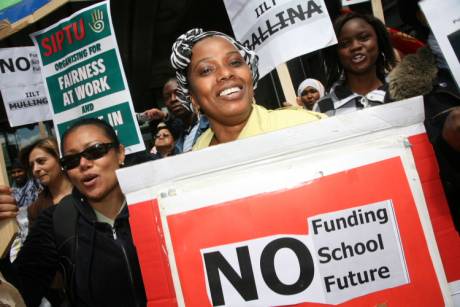
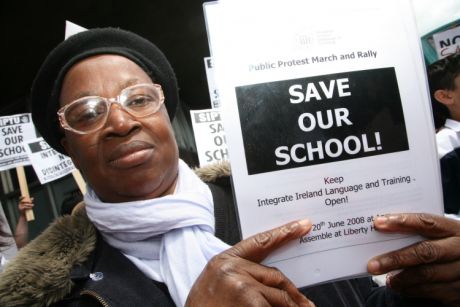
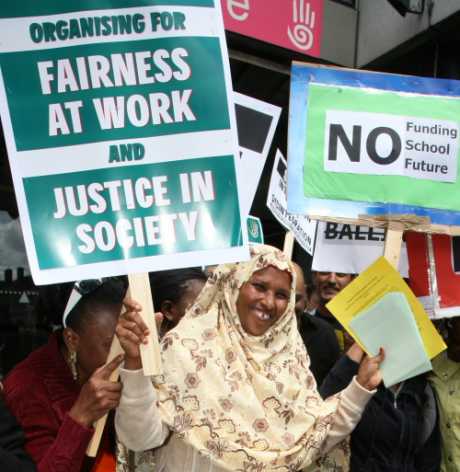
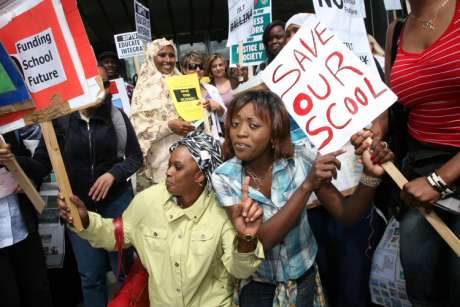

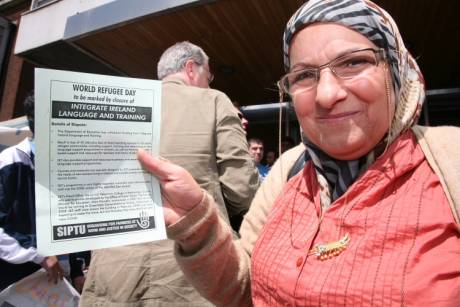
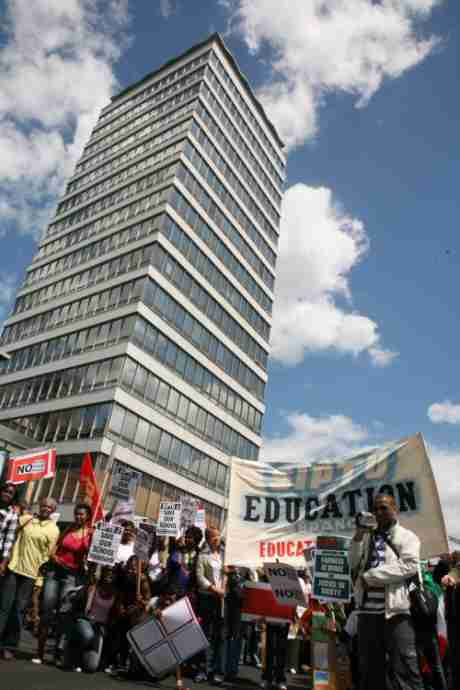
Comments (6 of 6)
Jump To Comment: 1 2 3 4 5 6(c)
All of these people, regardless of their status, are eligible to vote in the local elections next year.
They should all be registered and Fianna Fail should be told of this fact as soon as possible. Local elections, especially now the boundaries are being changed to increase ward sizes (which means 4,5 and 6 seat wards) can be swung on a few dozen votes.
The City Council franchise office will give all the details of getting on the register: 16/19 Wellington Quay. Dublin 2. Phone No: 222 5010
Remember- even asylum seekers can vote in local elections.
The fact is that prior to the march these immigrants were manipulated - fed a convenient half truth by those with the full facts to inflate the anger/attention because these providers may lose their jobs. They weren't worried about anyone but themselves.
It's ironic that SIPTU shold be involved with Integrate Ireland while at the same time in the pay talks they're doing all they can to stop English Language students having the right to work a measly 20 hours per week.
“Profits up, wages down!” … has been the mantra among the ruling class in Ireland throughout the celtic tiger era; but money was cheap to borrow until recently and that covered the cracks for alot of people while the purchasing powerof their wages dropped by design.
Successive pay agreements have tied ordinary workers into beneath inflation pay “increases”, as well as “no-industrial-action” clauses. This renders trade union members virtually powerless.
Note all the talk of recession and pay restraint whenever new pay talks/national agreements talks are in the offing?
Note all the blaming of the public service pay bill for the country’s fiscal difficulties?
Let’s examine that, briefly:
Let’s say I am a public servant; a teacher, a nurse, a garda.
Let’s say I earn €50,000pa (I know, most of them don’t get near that, at least not for many, many years on the longest salary scales in the OECD; but the figure is just to make the maths easier for me!).
About half fo that goes STRAIGHT back to the boss/paymaster/government/exchequer coffersin PAYE and PRSI. (So, I really cost €25,000 in salary, unlike the private sector boss who des not get my tax out of the gross paid to me.)
Now, I buy petrol at the garage to get myself to and from work; the exchequer takes 72% of the money I pay for the fuel. The remaining 28% of my spend at the garage goes to slaries, profits, taxes on profits and salaries, PAYE, PRSI, Employers’ PRSI, rates and water charges, etc.; so most of THAT goes back to my paymaster/exchequer coffers too.
Then, I go to the supermarket and spend my net salary on food, etc., and the path back to the exchequer continues. I buy cigarettes and almost all of that money goes back; have a pint in the evening and most of tat goes back;
See what is happening to the salary the government pays the government employee?
Since most of it goes back to the coffers it came out of, why is the salary bill of the nurse/teacher/garda/public servant blamed for high government spending and why woud anyone refuse them a pay increase that, really, costs them next to nothing?
Ask a private sector employer if they would envy the position.
Tim,I don't agree with your rationale. Many in the public sector are doing very well, however, many at the lower levels are not. People do have choices of how they spend their money and all employees are subject to the same levels of indirect taxation.
We are a very high cost economy and wage restraint, for those who can afford it, will be necessary. It might give us the opportunity to look at the way we " consume ".
Of course the less well off will feel the squeeze, no prizes given out for predicting that.
Don't forget to factor in the pretty good pensions that those in the public sector will receive.
I work in the private sector and I have no pension.
Indymedia Ireland is a media collective. We are independent volunteer citizen journalists producing and distributing the authentic voices of the people. Indymedia Ireland is an open news project where anyone can post their own news, comment, videos or photos about Ireland or related matters.